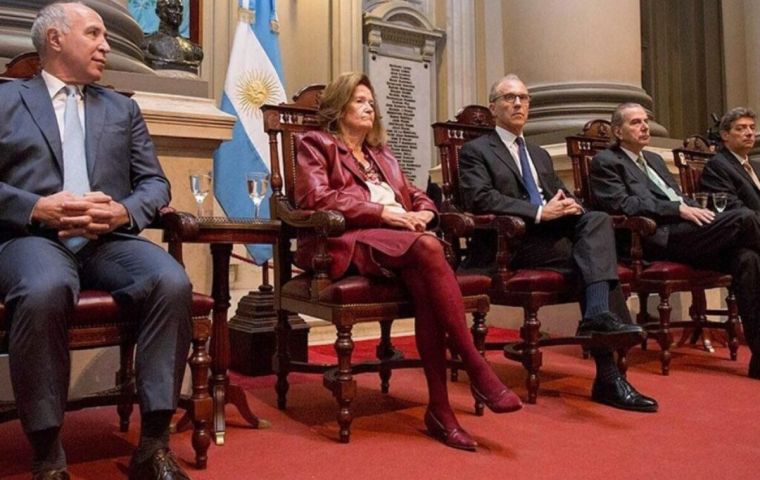MercoPress. South Atlantic News Agency
Controversial ruling of the Argentine High Court on the removal and relocation of magistrates
 The three magistrates involved in the controversy have in their courts cases referred to Kirchner family and associates alleged corruption practices
The three magistrates involved in the controversy have in their courts cases referred to Kirchner family and associates alleged corruption practices The Argentine Supreme Court ruled in a 4 to 1 vote that two magistrates that had been relocated during the previous government of President Mauricio Macri must remain in their posts until a new qualification contest takes place to fill the posts.
Justices Ricardo Lorenzetti, Juan Carlos Maqueda, Horacio Rosatti and Elena Highton de Nolasco held the majority position while the president of the Court Carlos Rosenkrantz, dissented on the case involving magistrates Leopoldo Bruglia, Pablo Bertuzzi and German Castelli. The ruling refers to the first two, while Castelli's situation will be addressed on Thursday.
The ruling points out that there is an only procedure to appoint new magistrates, which includes a short list by the Magistrates' Council, the election of a candidate by the Executive and the agreement in the Senate, a process which was not respected in the case of Bruglia and Bertuzzi. However the two presented an appeal to the highest court to consider their appointments definitive, but this was rejected arguing that “actions contrary to the Constitution do not generate rights”.
The Supreme Court also ruled that the Senate confirmation as established in the Constitution must be complied and called on Congress to approve a bill that regulates the relocation of magistrates and thus avoids conflicts between government branches and constitutional debates, specifically referred to magistrates, appointments and duties.
The three magistrates are on the firing line because they must address and decide on several corruption cases involving the Cristina Kirchner family and associates, which the vice president is determined that they are dropped.
The high court actually ruled on a highly political issue following the per saltum presented by the magistrates, when they were suspended from their relocation, because the Magistrates Court called for a review of their appointments arguing they missed de Senate approval step.
Following the ruling, the magistrates will remain in their posts and all their decisions previous and after the ruling are considered valid, even while they must comply with the Senate mandatory procedure. Bruglia and Bertuzzi must contest for their current posts together with other applicants proposed by the Magistrates' Court, to comply with the normal appointment of magistrates.
Although there is already a current contest, 412, the high Court decided to open a new one which will decide who will occupy the relocated posts of Bruglia and Bertuzzi. The new contest if it can start before the end of 2020, would anyhow take a couple of years, according to the Magistrates Court, but Justices also considered it sufficient time for the political system to negotiate a definitive accord on the relocation issue.
The majority ruling argued that if a relocation as the one described, is considered definitive, automatically it could become a second, short cut to appoint magistrates “discretionally”, interfering with the autonomy of the Judicial branch.
But the dissenting argument from Justice Rosenkrantz referred to what was described as the “institutional gravity” which means the relocation of magistrates, and the suspension of their relocation represents a violation of the “immobility guarantee”, consecrated in the Constitution for magistrates. Furthermore constitutional experts recalled that the current relocation of magistrates is a long established procedure in the Argentine judicial branch and offered a list of 65 experiences.
The ruling has 37 considerations, with the first seven reporting on the circumstances and background of the case and from point 8 addresses the matter, the constitutional status of magistrates Bruglia and Bertuzzi, and the “institutional gravity” which could result from the transitional condition of magistrates posts.
As a consequence it declares unconstitutional the Magistrates Council decision which ordered the review of the relocations; rejected the appeals of Bruglia and Bertuzzi and declared unconstitutional the “Rules for the relocation of magistrates”, besides the specific rulings for the two magistrates cases.




Top Comments
Disclaimer & comment rulesCommenting for this story is now closed.
If you have a Facebook account, become a fan and comment on our Facebook Page!